Posts Tagged ‘“bicycle accidents”’
Report: Helmet Use Encouraged After Increase in Cyclist Deaths
 After years of decline, a new report reveals that there has been an increase in the number of cyclists killed in motor vehicle accidents since 2010.
After years of decline, a new report reveals that there has been an increase in the number of cyclists killed in motor vehicle accidents since 2010.
The Governors Highway Safety Administration (GHSA) released the, “Spotlight on Highway Safety: Bicyclist Safety” report on Oct. 27th. The report shows cycling deaths have increased 16 percent from 2010 to 2012, from 621 to 722 cyclist fatalities. During that time, Massachusetts saw the numbers almost double, from seven cyclist deaths in 2010 to 15 in 2012. The majority of cyclist deaths came from six states, including California, Florida, Illinois, New York, Michigan and Texas.
During this period, other deaths in motor vehicle accidents increased by just one percent.
Two thirds or more of cyclists killed in 2012 were not wearing bike helmets, “a major contributing factor” in deaths because many cyclists suffer serious head injuries, the GHSA said.
More details from the report:
Bike helmet use. Citing 2012 Fatality Analysis Reporting (FARS) data, the GHSA report showed 65 percent of cyclists who died in 2012 were not wearing a bike helmet. Meanwhile, just 17 percent of cyclists were confirmed to be wearing one. Helmet use was unknown for the remaining 18 percent.
Twenty one states, including Massachusetts, have laws mandating bike helmet use for children. But none requires helmet use for adult riders and the GHSA said use has to be encouraged.
In Boston, city officials have raised the idea of mandating bike helmet use. It would not be the first city to do so. Sykesville, Maryland requires cyclists of all ages to wear bike helmets. But such ordinances are largely controversial. Dallas, Texas passed a law mandating helmets for all ages, but city officials revised it this summer, limiting it to cyclists who are 17 and under.
As it stands in Boston, riders of the Hubway bike share must agree to wear bike helmets when they sign up. The City of Boston has actively promoted bike helmet use over the years through advertising campaigns and community outreach programs.
Breakstone, White & Gluck has also worked to increase bike helmet use among children in Massachusetts. Over the past two years, we have donated 3,000 bike helmets through community organizations. We are proud of this work and will be back in 2015.
Our program partners include: Boston Bikes’ Roll It Forward, a program run by the City of Boston, Worcester Earn a Bike, CYCLE Kids, Cambridge Public Schools, Somerville Public Schools, Bikes Not Bombs, Framingham Bicycle and Pedestrian Committee, East Arlington Livable Streets and Arlington Public Schools, Watertown Bicycle and Pedestrian Committee, Westborough Bicycle and Pedestrian Committee, Somerville Kiwanis, Dedham Bike Rodeo, Boston Cyclists Union, Arlington Town Day, Westwood Bicycle and Pedestrian Committee, Lexington Bicycle Advisory Committee and the Ashland Farmer’s Market and iCan Shine Camp of Arlington.
State safety efforts. The GHSA touched on safety improvements which communities can make and strongly encouraged development of cycle paths. These go a step further than traditional bike lanes and physically separate motor vehicle traffic from cyclists on the road with flexible posts or other safety measures.
If communities cannot add cycle paths, the GHSA suggests adding marked bike lanes, bike boxes which designate space in a lane for bikes at intersections, and separate bike traffic signals with advance lights for cyclists.
Boston has a 5-year action plan to build 21 miles of cycle tracks in various areas of the city.
Read the full report, “Spotlight on Highway Safety: Bicyclist Safety.”
Read More
Breakstone, White & Gluck Donates 100 Bike Helmets, Partners with the Westborough Bicycle and Pedestrian Advisory Committee
Cycling safety became a fun lesson in Westborough last weekend, as 100 children learned a few basics about the road and got to take home new bike helmets.
 The Westborough Bicycle and Pedestrian Advisory Committee and attorney David White handed out the bike helmets on Saturday at the Westborough Spring Festival and the Boroughs Family Branch of the YMCA of Central Massachusetts.
The Westborough Bicycle and Pedestrian Advisory Committee and attorney David White handed out the bike helmets on Saturday at the Westborough Spring Festival and the Boroughs Family Branch of the YMCA of Central Massachusetts.
Breakstone, White & Gluck donated the helmets and will donate more at several other events in the Boston area this year. Our goal is to encourage bike helmet use to reduce the risk of head injury among children. This is the second year we have donated bike helmets to children and our first year working with the Westborough community.
“It was a pleasure to work with the Westborough Bicycle and Pedestrian Advisory Committee, the Westborough Rotary, and the Boroughs Family Branch of the YMCA of Central Massachusetts,” attorney David White said. “We were able to quickly fit 125 bicycle helmets on young kids–and an occasional parent too!”

Each year, 26,000 children and adolescents sustain traumatic brain injuries related to cycling and are treated in U.S. hospital emergency rooms. In 2010, children and teenagers under the age of 20 accounted for about half of all 515,000 bicycle-related injuries in the U.S.
The Westborough Bicycle and Pedestrian Advisory Committee’s mission is to explore ways Westborough can become safer for pedestrians and cyclists, work to develop a rail trail along an old trolley line in town and advise the Board of Selectmen on roadway safety issues and preventing bicycle accidents. In addition, the committee is working to encourage private and community investment in bike racks and signage.
Photos: Top: Bruce Tretter and members of the Westborough Bicycle and Pedestrian Advisory Committee and attorney David White of Breakstone, White & Gluck at the Westborough Spring Festival. Bottom: Attorney David White at the Boroughs Family Branch of the YMCA of Central Massachusetts.
Visit our Bike Safety Outreach page to learn more about our bike helmet donation events.
Donate Old Bicycles to Boston Bikes’ Roll It Forward Program
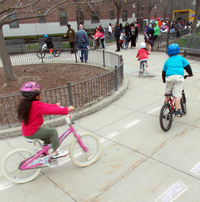
If you have old bicycles you no longer need, consider donating them to a worthy cause this holiday season.
You can donate your old bikes to Boston Bikes and the Roll It Forward program. Boston Bikes manages the city of Boston’s cycling programs, such as the popular Hubway bike share.
Roll It Forward is one of its projects, which repairs and distributes bikes to low-income Boston residents and children who may not otherwise have access to a bike. To date, the program has distributed over 2,400 bicycles.
In 2013, we had the pleasure of contributing to Boston Bikes and Roll It Forward. We donated bike helmets for their youth bike giveaways. We also attended some of the events to help fit helmets, and we got to see first-hand how much the children love seeing those bikes!
We encourage you to consider this organization if you have a bike you are not using. Donating is easy. You can choose among several locations in Greater Boston. Landry Bicycles is collecting bikes at its Boston, Natick, Norwood and Westwood stores in December.
In addition, on Wednesday, Dec. 18, from 6:30 – 8:00 p.m., Landry’s Bicycles in Natick is hosting a meet and greet reception for bike donors. It will celebrate local bicycle-recycling efforts in the area by Boston Bikes’ Roll It Forward, the Worcester Earn-A-Bike and Bikes Not Bombs, another group that, among other things, does great work teaching Boston children how to ride and repair bicycles (and another fine organization that we support!).
Read More
Breakstone, White & Gluck Donates 750 Bike Helmets to Youth Programs in Boston
BOSTON, MA – May 16, 2013 – Breakstone, White & Gluck, P.C., announced today that it will donate 750 bicycle helmets to youth in the Boston area, through programs in Boston, Somerville, Cambridge and Dedham.
Attorney David W. White, a member of the firm, said, “We are always looking for ways to give back to the community. This spring we are focusing on preventing head injuries in children by donating helmets where they are needed.”
The firm will donate helmets this spring and summer through these programs: Mayor Menino’s Boston Bikes Roll It Forward program; CYCLE Kids of Cambridge; the Winter Hill Community School in Somerville; the Dedham Bike Rodeo and Bikes Not Bombs of Jamaica Plain.
White said, “This is the first year of our project, and we look forward to expanding it significantly in years to come. Awareness of head injury prevention is critical for the health of our children. We hope that our helmet distribution will help increase safety awareness and prevent injuries.”
Read more about the bicycle safety programs our law firm will support this year.
Hubway Bike Share Program Returns to Boston
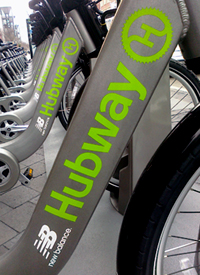 The New Balance Hubway bike sharing program re-launches in Boston tomorrow. Sixty percent of the stations will open, with the remainder scheduled to offer bike rentals by April 1.
The New Balance Hubway bike sharing program re-launches in Boston tomorrow. Sixty percent of the stations will open, with the remainder scheduled to offer bike rentals by April 1.
Hubway opened last July and had a busy first season with 3,650 cyclists signed up as annual members. The system, which is partially funded by the Federal Transit Administration, is operated by Alta Bike Share in partnership with Boston Bikes, an initiative of the City of Boston.
Cyclists can join as annual members for $85 per year or use the system as casual members and pay $12 for 3 days or $5 for 24 hours. The first 30 minutes of each ride is included in the cost, with riders paying for additional time based on their membership plan.
The schedule for opening bike rental stations could be delayed depending on weather conditions. Hubway recommends cyclists visit the Station Map page of its website to monitor progress, follow the program on Facebook or Twitter or download its free Spotcycle application to their smart phone.
The Boston bike accident lawyers at Breakstone, White & Gluck offer these safety tips for cyclists and drivers to avoid cycling accidents:
For Cyclists:
Wear a helmet. Protect yourself from sustaining injuries in bicycle accidents. Your purchase agreement with the Hubway program also requires it. Riders can purchase helmets when they register for the program. Helmets may also be available at some stations and the program has arranged for a number of local retailers to offer helmets at a discounted price of $7.99.
Cyclists should generally ride to the right of traffic, on the right side of the road. Bicyclists may also operate in bike lanes where available and in the center of the lane. Up to two bicyclists may travel abreast in the same lane. Cyclists are not permitted to ride on sidewalks in business districts and many areas of Boston.
Cyclists should never ride against traffic. They have to stop at red lights and stop signs just like motor vehicle traffic.
For Drivers:
Watch your speed! Drivers should travel at the speed limit or slower when conditions involving other vehicles, cyclists or pedestrians warrant it. Unless posted otherwise, state law requires drivers to travel at 30 mph in thickly settled or business districts and 40 mph outside of these areas.
Drivers should take caution turning to avoid bike accidents. Drivers who are turning left must yield the right of way to cyclists.
Drivers should look before they exit a parked car so as not to injure or impede the travel of a passing cyclist. This is illegal, can cause bicycle accidents and carries a fine of up to $100.
Drivers must have adequate room to pass a cyclist. They must also have enough space before returning back to the lane.
Related:
- Facts About Cycling in Massachusetts
- What to Know if You’ve Been Injured in a Bicycle Accident
- New Balance Hubway Program
- Bicyclists Can Protect Themselves By Buying Extra Car Insurance
- MassBike
Bicycle Accidents Rare in Boston Hubway Program, Officials Report
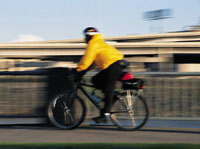 Boston’s popular Hubway bike sharing program will expand into Cambridge and Somerville next spring, providing more opportunities for healthy, environmentally-friendly and fun travel.
Boston’s popular Hubway bike sharing program will expand into Cambridge and Somerville next spring, providing more opportunities for healthy, environmentally-friendly and fun travel.
Boston’s program, which began in July 2011, is scheduled to close its 60 bike rental stations and 600 bikes this week for the winter. Bikes are expected to be available again next March, weather permitting. At the same time, Cambridge plans to open 20 stations in areas such as Harvard, Central and Inman squares. Somerville plans to open 8 stations including in Porter, Union and Davis squares.
Brookline is also working on adding two Hubway stations at Coolidge Corner and Brookline Village.
Boston’s Hubway program had 3,650 annual members in its first season. The system is partly funded by a $3 million grant from the Federal Transit Administration. It is intended for short trips as an extension of public transit. Annual members who pay $85 per year and those with one-day $5 and three-day $12 memberships can take unlimited rides, but they must return bikes within 30 minutes to avoid incurring additional fees.
Among annual members, the average ride lasted 17 minutes.
As officials close up the Boston program for the winter, they report concerns over an increase in bicycle accidents never materialized. The program saw no serious bike crashes requiring ambulance response and only two bike accidents overall.
But one issue is less than half of Hubway cyclists appeared to wear bike helmets, the program reported. Nearly 75 percent of riders on other bikes wore helmets. The city of Boston has tried to boost bike helmet use by working with 30 bike shops to offer subsidized bike helmets for less than $10.
The Boston bike accident lawyers at Breakstone, White & Gluck urge cyclists to learn Massachusetts bicycle laws. Click here for our guide.
We also urge cyclists to consider purchasing bicycle accident injury protection through their automobile insurance policies. Check your uninsured and underinsured motorist coverage, which provides protection if there is a bicycle accident. This insurance is affordable and can ease the physical and financial recovery after a bicycle accident. Click to read our guide What Every Bicyclist Needs to Know About Car Insurance.
Click here to read an article in The Boston Globe about the Hubway bicycle sharing program.
Click here to learn more about Boston’s Hubway sharing program.
Read More
Walmart Recall of 91,000 Defective Bicycles; Specialized Also Issues Bike Recall
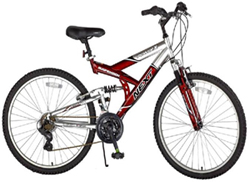 Anyone who has recently purchased a $100 bike at Walmart wants to pay attention to a bicycle recall issued this week.
Anyone who has recently purchased a $100 bike at Walmart wants to pay attention to a bicycle recall issued this week.
Bridgeway International of Naples, Florida has recalled 91,000 “NEXT”-branded men’s 26-inch hybrid bicycles. The products have a defective bicycle chain that can break and cause the bicyclist to lose control and fall in a bicycle accident.
The importer is aware of 11 reported incidents, including nine involving lacerations and other personal injuries.
The bicycles are red and orange and are marked “Power X” and “Suspension.” They were sold at Walmart from February 2011 through July 2011 for about $100. The model numbers are LBH2611M and LBH2611M2. The bicycles were manufactured in China.
Consumers are advised to stop using the recalled bicycles. They can contact the company for a free repair at 877-934-3228 or visit www.powerxbike.com for more information.
Defective Specialized Bicycle Recall. Separately, 14,200 bicycles with a defective brake component were recalled this week by Specialized Bicycle Components, Inc., a Morgan Hill, California distributor.
The bicycles have Advanced Group carbon forks and were manufactured by Advance Group, of Taiwan. The brake component housed within the bicycle’s carbon fork can disengage from the fork, allowing the brakes to contact the wheel spokes while rotating, posing a risk for falls and bicycle accidents.
There have been two reports of brake components disengaging from the carbon fork. No injuries have been reported.
The bikes were sold at authorized specialized retailers nationwide from June 2010 through August 2011 for $700 to $2,000. Consumers should stop riding these bicycles and return them to an authorized specialized retailer for a free repair or replacement. More information is available at 877-808-8154 or www.specialized.com.
Read More
Cambridge and Somerville Ranked Among Top U.S. Cycling Cities
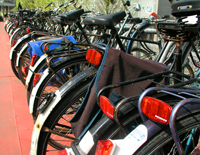 Local cyclists have long known Cambridge and Somerville offer some of the best riding in Greater Boston. But a popular website now says they are among the foremost biking destinations in the nation.
Local cyclists have long known Cambridge and Somerville offer some of the best riding in Greater Boston. But a popular website now says they are among the foremost biking destinations in the nation.
The Street.com recently released its 10 Best U.S. Bike Cities of 2011 list, naming Cambridge the fifth best bicycling city and Somerville the ninth. Boulder, Colorado was the leader.
Cambridge was praised for the strong network of bicycle lanes and shared lane space along the Massachusetts institute of Technology (MIT) campus and nearby technology companies, such as Genzyme, Sanofi Aventies, Biogen Idec and Akamai.
Cambridge bicyclists make up 8.5 percent of the city’s population. The city has several bike shops. Cambridge Police are active in educating the public about taking steps to prevent bicycle accidents. The Cambridge Bicycle Committee has been working to improve safety conditions and reduce bike accidents since 1991.
Somerville was recognized for its bicycling infrastructure and the strong community support for bicyclists. Some 5 percent of the city’s residents are cyclists. Many riders are college students, who account for 16 percent of the population. The city neighbors Medford, home to Tufts University, and Cambridge, where Harvard University, MIT, Leslie University and Cambridge College are all based.
Somerville was praised for its “walkable, accessible squares,” and bicycle-friendly businesses, which offer Tour de France specials, bicycle valet services and benefits for local bike groups. Businesses also host an annual bike party that shuts down a portion of Davis Square.
Somerville has several bike shops and formed the Somerville Bicycle Committee in 2001. The committee has overseen development of new bike lanes, sharrows and multi-use paths to prevent bicycling accidents and personal injuries. It has also guided the development of on-street bike parking in corrals and the ongoing installation of bike racks.
To read the 10 Best U.S. Bike Cities of 2011 report, click here.
Click here to learn more about Massachusetts bicycling laws.
Read More
Youth Bicycle Helmets Recalled
 Parents are advised to check their children’s bicycle helmets after a widespread recall involving popular models sold at Walmart and Amazon.com. The recall may affect families and cyclists in Massachusetts.
Parents are advised to check their children’s bicycle helmets after a widespread recall involving popular models sold at Walmart and Amazon.com. The recall may affect families and cyclists in Massachusetts.
Bell Sports of Scotts Valley, California is recalling 33,600 of its Bell Exodus full-face helmets with a plastic buckle on the chinstrap. The defective bike helmets have an angled visor and came in multiple colors in youth size. They were sold at Walmart stores and Amazon.com for $50 to $60 between August 2009 and March 2011.
The helmets pose a head injury hazard in the event of bike accident. The plastic buckle that connects the chin straps can fail and cause the helmet to fall off the person’s head, leaving them unprotected in bicycle accidents. The company has received one report of a buckle failing, resulting in a personal injury that required facial stitches.
Some 31,100 of the defective bike helmets were sold across Massachusetts and the United States. Another 2,500 helmets were sold in Canada.
Consumers are advised to stop using the helmets immediately. Read about the bike helmet recall on the Consumer Reports website. You will find a list of model numbers.
Contact Bell Sports if you have a defective helmet and request a free replacement. Call Bell Sports toll-free at 866-892-6059 between 8 a.m. and 5 p.m. CT Monday through Friday.
If you are a cyclist, wearing a helmet is critical to reducing the risk of head injuries. It is also critical for your children. It is important to purchase a helmet which is safe for use, meets CPSC standards and to learn how to properly fit your helmet. To learn more, read this brochure from the NHTSA – and share it with your friends and family members who ride.
Another important safety tip is to replace your helmet regularly. We hope you never fall or are injured in a bicycle crash, but if you do fall, your helmet should be able to absorb the fall and provide protection. Once a helmet hits the ground in a crash, it should be replaced right away. If you don’t crash, you maybe able to use your helmet for a few years. You have to carefully inspect your helmet, evaluate the condition of the helmet and the wear and tear on helmet straps. Some people should replace helmets every year and others may work for two or three years.
In Massachusetts, cyclists who are 16 and younger are required by law to wear bicycle helmets. Bike share programs in the Boston area typically have language in their rider contracts, requiring cyclists to wear helmets at all times. Wearing a bicycle helmet is a step every cyclist can take to protect themselves, so we hope you and your family take time to purchase helmets and commit to wearing them. Read More
Motorists, Please Help Prevent Accidents: Look Closer for Bicycles and Motorcycles
It is Bay State Bike Week in Massachusetts, a time to focus on safety for cyclists. During this week, cyclists are hard to miss as they gather at large events in Boston, Cambridge and across the state.
But the daily reality is many Massachusetts cyclists are far less visible to drivers, spending the majority of their time riding alone or in small groups. And when drivers get behind the wheel, they usually pay attention to other motor vehicles and pedestrians at crosswalks. But bicyclists and motorcyclists tend to get lost in the scenery, which can lead to bicycle accidents and motorcycle accidents.
We do not make this observation alone. We join many others, including the Transport for London (TPL), which manages a complex transportation network that includes buses, railway, underground trams and more than 900 miles in roads. It also manages a popular cycle hire service, which allows visitors and residents to rent bicycles 24 hours a day from docking stations around the city.
TPL has gained an Internet following in recent years with its “Think!” campaigns, asking members of the public to test their awareness of what they are viewing. We encourage you to watch one eye-opening video below. Others can be found at http://www.awarenesstest.co.uk/.
http://www.youtube.com/watch?v=47LCLoidJh4
We suggest that you watch for changes or unique placements on the screen. But even with this warning, many people have to be told how the scene changes. The message: we should all take a closer look as we travel among others in our daily lives.
Motorists should take a closer look on the roadways to make sure they see bicyclists and motorcyclists. Doing so will prevent motor vehicle accidents, bicycle accidents, motorcycle accidents and save lives.
Read More

